The Beginner’s Guide: Woody Allen, Director

Jax is a filmmaker and producer, and a film &…
After bugging my colleagues with discussion on Woody Allen films maybe one time too many, it was suggested that I write his Beginner’s Guide. Surprisingly, the thought hadn’t occurred to me, but I’m very excited to present my guide for you here now. I’ve gone a slightly different approach than usual because of the sheer amount of films the man has made in his still-continuing career, so it’s broken up into segments rather than a few films you should watch to get you started.
First, a little background.
Woody Allen was born Allan Stewart Konisberg in Brooklyn at the dawn of World War II in 1935. He grew up heavily influenced by jazz and, in fact, still plays the clarinet (rumour has it you can catch him with his jazz band in New York to this day). Jazz features regularly in nearly all of his films and he’s become known for opening his films with a jazz number over white credits in Windsor font.
At the time of writing, he has 52 director’s credits and 76 writer’s credits on the IMDB and has been nominated for over 300 awards. One of the most prolific directors ever, he has made one film a year since 1982 (and on more than one occasion he made two films in one year).
He is known for a very distinct, minimal directing style, preferring to capture dialogue scenes in master shots if possible. I personally definitely consider him an actor’s director, and I think that shows in the line of top actors practically lining up to work with him. He started with stand-up and theatre, but moved fairly swiftly to the big screen with Take the Money and Run (What’s Up, Tiger Lily doesn’t count, he just overdubbed it).
The Early, Funny Ones (1966-1975)
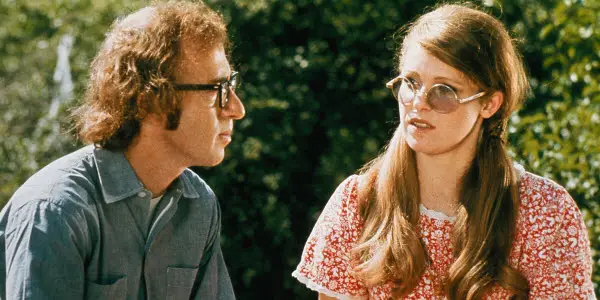
Woody Allen got his career start with slapstick classics such as Take the Money and Run, Sleeper, and Bananas. This is where audiences became familiar with the neurotic “Woody Allen character” that his comedies are famous for. Developing a devoted fanbase after the success of Take the Money and Run, Sleeper, and from his acting appearances in Play it Again Sam and Casino Royale, Allen began developing from broad comedy into satire with Love and Death. Love and Death satirises Russian storytelling with a slapstick twist and it marks the second in a long series of important collaborations with Diane Keaton.
Many people rank these as their favourite Woody Allen films. While I personally disagree, I completely understand their importance in Allen‘s career. These were the testing grounds, and the films come across as wonderfully raw and unmarred by Hollywood sheen. He conducted his first genre experiments (documentary, adaptation, etc.) in these initial few years, and would return to some of them at different points later in his career. For instance, Sleeper essentially allowed Allen to make a silent film long after the age of silent cinema had fallen.
Contrary to popular opinion, these films are my least favourite of his. While I enjoy them and there’s nothing wrong with a bit of good, old-fashioned fun, they feel relatively empty compared to the hard but painfully funny looks at love, life, depression, and sex he would give us later.
Annie Hall (1977)
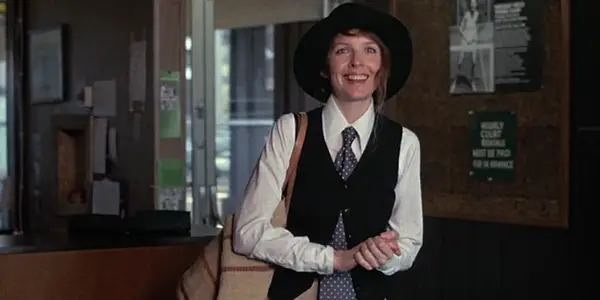
Yes, Annie Hall gets its own category. No, I don’t care that it doesn’t fit the rest of the format. Annie Hall marks an important moment in Woody Allen’s career. This is the film that made critics take him seriously as a filmmaker, not just a comedian. One of my college tutors once said to me that Annie Hall contains every imaginable narrative device. We start with direct address to the camera, then you have standard narrative, there’s voice-over, the scene of subtitled subtext, and the hypermediated (this is a fun concept to do with media within media, read more about it here) cinematic experience when Alvy pulls Marshall McLuhan from just off-screen – it’s boggling when you start to list them.
However, what is truly astonishing is how well it all works together. Annie Hall is a film deconstructed, yet offers an insightful, relatable, and moving look into the love story of this particular fictional couple. It’s arguably Allen’s best film. Including a little bit of everything, it manages not to feel overworked. The comedy comes off naturally and the jokes still play, and the developed conflict remains relevant to modern audiences. Fun fact: the “cocaine” scene (and if you’ve seen Annie Hall you know the one) was actually not scripted, Woody Allen is just that much like his character.
This leap in comic and dramatic maturity went hand in hand with a top-notch crew. Allen hired cinematographer Gordon Willis of Godfather fame to shoot this film and continued to work with him for several more films. This marks the beginning of Allen surrounding himself not just with skilled craftsman, but respected visual masters. From this point forward, the directorial quality of his films vastly improves.
The Bergman Era (1978-1992)
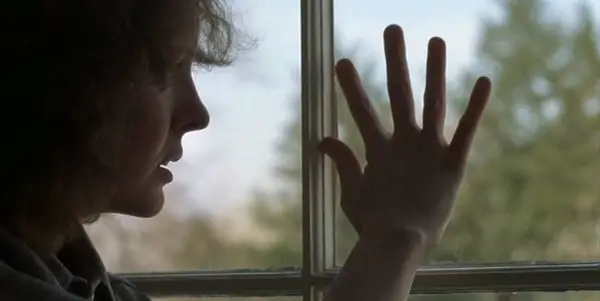
After Annie Hall, Allen’s films took a dramatic turn, by which I mean he focused much more heavily on dramas for the next 16 years. There are notable comedies peppered here and there – Purple Rose of Cairo and Zelig, in particular – but for the most part, Allen goes extremely dark and several of the films show a Scandinavian influence, almost certainly Ingmar Bergman. Films such as Interiors, September, Hannah and Her Sisters, Another Woman, Crimes and Misdemeanors, and Husbands and Wives are predominantly quiet, often overlooked, dramas.
During this time, Allen moved from his collaborative efforts with Diane Keaton and began working extensively with his then wife, Mia Farrow. Allen also formed his occasional partnership with Bergman DP Sven Nykvist in this period, giving him the ultimate Scandinavian street cred. Which probably came in handy if you were Woody Allen in the 1980s. Which he was.
The 80’s in particular seems to be a forgotten period of Woody Allen’s work. There certainly seemed to be a desire in audiences for a return to comedy from the director, and not many of his films at this time were major box office success.
There is the fantastic exception of Hannah and Her Sisters, which won three Oscars and was nominated for another four, and is also the source of my all time ever favourite movie trivia. Michael Caine won Best Supporting Actor for his performance in the film and couldn’t attend the ceremony because he was filming Jaws: The Revenge. Best. Trivia. Ever.
The “Slump” (1993-2004)
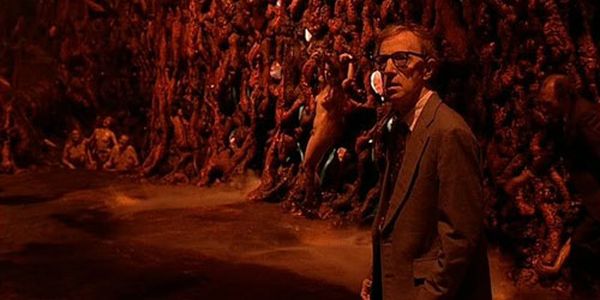
Now we get to a weird spot. They’re generally considered by critics to be the slump in Allen’s career, but there are several films worth checking out. I’m big enough to admit that the 90’s and early 2000’s contain some of the weakest films of Woody Allen’s oeuvre, but there are some definite exceptions I feel duty-bound to mention. Many of the films from these years are not only watchable, but are very good, and were well-rated and received. It does seem like there’s selective memory where we just recall The Curse of the Jade Scorpion and not some of the films I’m about to mention.
Definitely check out Deconstructing Harry, which has an amazing cast including Robin Williams and Judy Davis, and Allen gets creative with his storytelling. Sweet and Lowdown, Allen’s ode to Django Reinhardt, is also great with Sean Penn playing the lead role (not Django). I love Manhattan Murder Mystery, which reunited Woody Allen with Diane Keaton, and though I’ve been told I’m very wrong about that, it has a 93% on Rotten Tomatoes, so who are you going to trust? Me or some random person I told you about to illustrate a point in my article?
A couple other ones to note: Bullets Over Broadway and Everyone Says I Love You (I mean, it’s a musical by Woody Allen, how can you NOT like that?).
Current Endeavours (2005-present day)
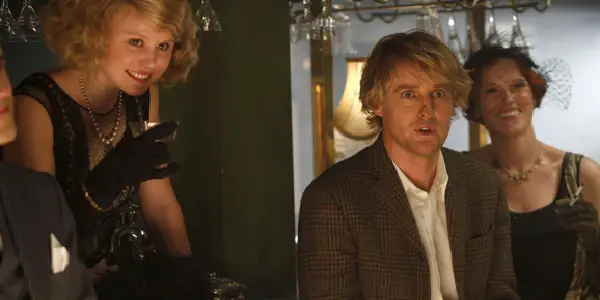
The last several years have seen Allen’s films returning to critical esteem as well as returning to looking at darker themes. In particular, Match Point, Cassandra’s Dream, and Blue Jasmine were all dramas, and were generally well-received. Several of the films, dramas and comedies alike, have been nominated for Best Screenplay. While there have been a few weak points (I’d say Scoop and Whatever Works), the last 10 years have shown a very interesting variety of films and some new explorations.
Both Match Point and Cassandra’s Dream deal with murder and its consequences. They are dark, serious and masculine dramas unlike his dramas of the 80’s, which were largely feminine. His best comedies of the time period, Midnight in Paris and To Rome With Love feel strangely autobiographical and somewhat bittersweet. Granted, his films are often touching on if not entirely biographical, but these have the feel of a man looking back at his life.
A very important distinction can be made between these films and Woody Allen’s previous endeavours in their location. Known for filming almost exclusively in New York, Allen rarely ventured out of the state, let alone the country to tell his stories. But starting with Match Point, suddenly Allen became an international filmmaker, setting his films in London, Paris, Barcelona, Venice, and Rome. Sometimes he seems to write love letters to these cities into his movies, through the way he chooses to express and highlight the various aspect of each place.
Hopefully, if you’re starting down your Woody Allen adventure, you’ll find this a suitable guide. Extra points to the hardcore fanatics who do what I did – watch each film in chronological order! It takes a few months, but you really get a sense of how he developed as a filmmaker and the different phases of his filmmaking career, so I can certainly recommend it for the faithful.
There are a few films I wasn’t able to get into in the article but they are worth time if you feel like digging deeper: The Front (not directed by Allen, but starring him, and a great film), Everything You Always Wanted To Know About Sex * But Were Afraid To Ask (Allen’s only adaption, and a groundbreaking film for its time), and Stardust Memories are all definitely worth a watch.
What are your thoughts on Woody Allen‘s career? Love, hate, or indifferent?
Does content like this matter to you?
Become a Member and support film journalism. Unlock access to all of Film Inquiry`s great articles. Join a community of like-minded readers who are passionate about cinema - get access to our private members Network, give back to independent filmmakers, and more.
Jax is a filmmaker and producer, and a film & tv production lecturer at the University of Bradford and is also completing a PhD about Stan Brakhage at the University of East Anglia. In the remaining "spare time", Jax organises the Drunken Film Fest, binges bad TV, and dreams of getting “Bake Off good” with their baking.













